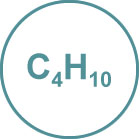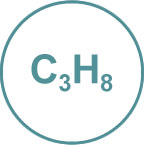PROPANE VS. BUTANE
LPG, or Liquefied Petroleum Gas, is the term widely used to describe a family of light hydrocarbons. The two most prominent members of this family are propane and butane.
Both types of gases are used for industrial and household purposes and have similar qualities that is why people often confuse them. There are certain differences between butane and propane which could either be advantageous or disadvantageous depending on how they are being used.
BASIC INFORMATION
CHEMICAL STRUCTURE

BUTANE
Molar Mass Density Boiling Point Melting Point Classification
58.12 g/mol 2.48 kg/m3 30.2°F (-1°C) -220°F(-140°C) Alkane
CHEMICAL STRUCTURE

PROPANE
Molar Mass Density Boiling Point Melting Point Classification
44.1 g/mol 493.00 kg/m3-43.6°F (-42°C) -306.4°F(-188°C) Alkane
SIMILARITIES
- Both are extracted from petroleum in oil or natural gas form. When combusted, they produce carbon dioxide, water, carbon monoxide and soot. Both are used to fuel vehicles and for heating stoves.
DIFFERENCES
- Propane has a lower boiling point than butane so it will continue to convert from a liquid to a gas even in very cold conditions, down to -45ºC. When stored as a liquid in a tank, it exerts a greater pressure than Butane at the same temperature. So Propane, as an LPG, is most suitable for exterior storage and use. Its ability to operate in low temperatures makes it the most suitable LPG for many applications. Propane is widely used as a fuel source for domestic and commercial heating, hot water and cooking. It also has a wide range of uses in industry and agriculture. When the fuel needs to be stored for a long time, propane is a better choice than butane. When people need to go camping, hiking or mountain climbing, especially in cold weather, propane is preferred over butane as a fuel for cooking.
- Butane has the lower vapor pressure at equivalent temperatures and is suitable for interior use or outside during the summer. Butane is a very common fuel among leisure users and owners of portable heaters and is known to be cheaper than Propane.
- Propane and butane are normally stored in either portable steel cylinders or small bulk fixed storage tanks ready for use.
To find out what type of gas you need for your equipment or device, please check our dedicated sitepage.


